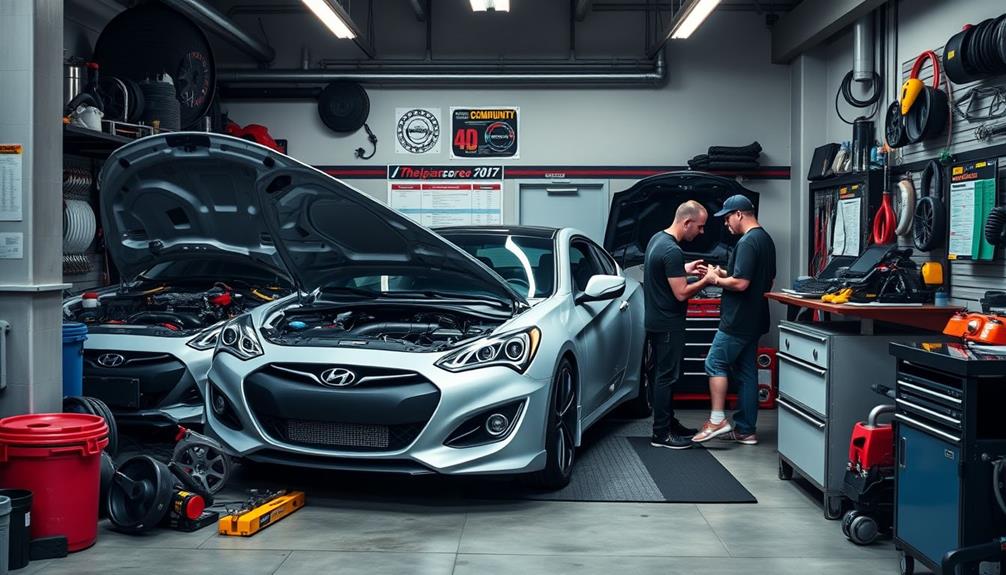Tuning your Hyundai Genesis Coupe can greatly boost its power and performance. Start with essential upgrades like a cold air intake and a cat-back exhaust system for immediate gains. Next, consider custom tuning to optimize your setup after modifications. You can also explore turbocharging for substantial horsepower increases. Engaging with the Genesis community can provide valuable insights and tips on effective tuning techniques. Don't forget to monitor critical performance metrics like air-fuel ratio and boost levels to guarantee everything operates seamlessly. There's so much more to uncover about maximizing your sport car's potential just ahead. If you’re looking for even more enhancement options, you can delve into the world of hyundai tiburon 2003 tuning for inspiration. Many enthusiasts have successfully modified their Tiburon 2003 for increased power and agility, and their experiences can provide valuable insight for your own Genesis Coupe. With the right combination of modifications and tuning, you can unlock the full potential of your Hyundai sports car and enjoy an exhilarating driving experience.
Key Takeaways
- Accurate model identification (BK1 or BK2) is essential for understanding tuning capabilities and maximizing power potential in the Hyundai Genesis Coupe.
- Start with cost-effective upgrades like a cold air intake and cat-back exhaust system to improve airflow and increase horsepower.
- Consider an E85 conversion kit for higher octane fuel, which can significantly enhance performance and power output.
- Custom tuning is crucial after modifications to ensure optimal engine operation and prevent damage from increased performance.
- Engage with the Hyundai Genesis community for shared knowledge and insights on effective tuning techniques and performance modifications.
Engine Tuning Potential
Tuning your Hyundai Genesis Coupe's engine can release impressive performance gains, especially if you're working with the 2008-2012 models featuring the 3.8L V6. These engines are already tuned to about 95% of their safe potential, giving you a solid foundation for further modifications.
The engine tuning potential of your Genesis Coupe is significant, allowing for performance upgrades that can elevate your driving experience.
To maximize your tuning efforts, it's vital to accurately identify your model designation, either BK1 or BK2. This guarantees you're working with the correct specifications and tuning capabilities.
With the right performance modifications, like an upgraded exhaust system or intake system, you can see horsepower increases of over 20% after proper dyno tuning. Fully modified engines can even achieve sub-310whp, showcasing the impressive potential hidden within your Hyundai Genesis Coupe.
Don't underestimate the impact of engine size and model designation. They play an important role in determining your vehicle's performance capabilities and tuning modifications.
With the right focus on engine tuning potential, you can release the true power of your Genesis Coupe and enjoy an exhilarating driving experience.
Performance Modifications Overview

When you're looking to boost your Hyundai Genesis Coupe's performance, focusing on essential upgrades can make a big difference.
Consider cost-effective strategies like a cold air intake and cat-back exhaust to maximize your power without breaking the bank.
These modifications set the foundation for even greater gains, especially when paired with proper tuning.
Essential Upgrades for Performance
To access the full potential of your Hyundai Genesis Coupe, essential performance upgrades can make a notable difference in power and responsiveness.
Start with the 3-Point Performance Cold Air Intake, which costs around $320. This upgrade lowers intake air temperatures, allowing your engine to breathe better, enhancing airflow and power.
Pair this with the 3-Point Performance Upper Intake Manifold Porting for $650, which further improves airflow, maximizing your engine's capabilities.
Next, consider a three-point performance throttle body upgrade for $100 to boost throttle response, ensuring your car reacts quicker to your commands.
A 220 Performance Ground Kit is also vital, as it restores performance lost due to poor grounding issues. For even greater gains, think about converting to E85 for approximately $660 or adding methanol injection kits priced between $450 to $650.
Don't overlook the importance of exhaust modifications. Cat-back systems range from $600 to $1000, while headers start at $600.
These upgrades greatly enhance airflow and overall performance, making them must-haves for dedicated Hyundai Genesis owners looking to release their car's full potential.
Cost-Effective Modification Strategies
While you might think performance modifications for your Hyundai Genesis Coupe have to break the bank, there are plenty of cost-effective strategies that can deliver impressive results.
Start with a 220 Performance Ground Kit to tackle grounding issues, an essential upgrade for around $600. Then, consider a 3-Point Performance Cold Air Intake priced at $320, which greatly enhances airflow and boosts your car's performance.
Next, you might want to upgrade to a ceramic-coated 3-Point Performance Upper Intake Manifold for $650—this modification can noticeably increase airflow, leading to greater power output.
Additionally, an E85 conversion kit for approximately $660 can maximize horsepower gains when paired with other performance modifications.
Turbocharging Vs. Nitrous Options

Turbocharging and nitrous options each offer unique advantages for boosting your Hyundai Genesis Coupe's performance.
Turbocharging systems can greatly increase horsepower and torque, often exceeding 100 hp with proper tuning. A well-tuned turbo setup provides power on-demand, making it more efficient for daily driving. However, stock engine internals may limit the safe boost levels, requiring additional modifications like upgraded injectors.
On the other hand, nitrous oxide (NOS) systems give a temporary power boost, commonly adding 50-150 hp, depending on your configuration. They're also a more budget-friendly choice, typically costing between $500 to $1,500 for the components, compared to turbo kits that can run around $7,000.
But remember, NOS requires careful management to prevent engine damage.
Proper tuning is essential for both systems. Turbo setups benefit from dyno tuning to optimize performance, while NOS systems need precise timing adjustments to avoid lean fuel mixtures that could lead to engine failure.
Ultimately, the choice between turbocharging and nitrous depends on your budget, driving style, and how much power you want on tap. Consider these factors to make an informed decision that elevates your Genesis Coupe's performance.
Community Knowledge and Resources

When you connect with the Hyundai Genesis community, you tap into a wealth of shared experiences and insights from fellow enthusiasts.
The technical documentation and guides available can help you navigate everything from tuning techniques to modification best practices.
Engaging in these discussions not only enhances your knowledge but also guides your decision-making on upgrades.
Shared Experiences and Insights
Tapping into the wealth of knowledge within the Hyundai Genesis Forum can substantially enhance your tuning journey. This vibrant forum community dedicated to Genesis Coupe enthusiasts boasts over 2 million posts and 61.4K members, making it a prime resource for shared experiences and insights.
Here, you'll find lively discussions about performance modifications that can take your ride to the next level. Engaging in these conversations can reveal the benefits of popular upgrades like the 3-Point Performance Cold Air Intake and Upper Intake Manifold Porting. Many users report significant horsepower gains—20% or more—through careful dyno tuning after modifications.
If you ever feel stuck, don't hesitate to reflect on reviving an old thread to tap into previous insights shared by seasoned tuners.
Moreover, the forum provides access to collaborations with local performance businesses, fostering a supportive environment for innovation. By exchanging ideas and tips, you'll not only enhance your understanding of tuning but also connect with others who share your passion for maximizing the potential of your Hyundai Genesis Coupe.
Immerse yourself and let the community guide you toward peak performance!
Technical Documentation and Guides
While diving into the world of tuning your Hyundai Genesis Coupe, you'll quickly discover that the Hyundai Genesis Forum is a treasure trove of technical documentation and guides.
With over 2 million posts since 2008, this community focuses on performance tuning and modifications, making it an invaluable resource for any owner.
Experienced members share their insights, ensuring you have access to collective knowledge that can help optimize your vehicle's performance.
You'll find recommended reading materials like technical manuals and tuning guides that explore turbocharger functionality, essential for understanding performance modifications.
Engaging in online discussions can illuminate common issues and troubleshooting techniques, allowing you to resolve challenges effectively.
These conversations help you grasp complex tuning concepts, enabling you to make informed decisions about your upgrades.
Whether you're a novice or seasoned enthusiast, the wealth of technical documentation available will empower you to enhance your Genesis Coupe.
Don't hesitate to leverage this community-driven knowledge, as it can greatly improve your tuning experience and drive.
Essential Performance Parts

Upgrading your Hyundai Genesis Coupe with essential performance parts can greatly enhance its capabilities and driving experience.
Start with the 3-Point Performance Cold Air Intake for about $320, which boosts airflow and reduces intake air temperatures with a ceramic coating. This upgrade sets the foundation for improved engine performance.
Next, consider porting the 3-Point Performance Upper Intake Manifold—a $650 investment that considerably increases airflow and power output for your 3.8L engine.
To further enhance throttle response, upgrade to a three-point performance throttle body for around $100. This small change can make a noticeable difference in acceleration.
Don't overlook the importance of effective grounding; installing the 220 Performance Ground Kit can resolve grounding issues and restore lost performance, ensuring your engine runs at peak efficiency.
Also, if you're serious about maximizing power, converting to E85 for about $660 offers higher octane fuel, which can lead to substantial gains when paired with appropriate tuning.
Tuning Solutions and Techniques

When it comes to getting the most out of your Hyundai Genesis Coupe, effective tuning solutions are important after you've made performance modifications. Custom tuning, like what Alpha Speed Tuning offers, guarantees your engine operates efficiently, maximizing power output.
One of the key aspects of tuning is monitoring the air-fuel ratio (AFR). Using an AFR gauge, such as those from Knobbie or VLS, lets you adjust the fuel mixture for best combustion. This is essential, especially when increasing turbo boost levels.
As you approach those turbo limits, incremental power gains may diminish, making careful tuning significant to avoid engine damage.
Additionally, if you're boosting your performance, upgrading injectors is often necessary. Higher boost levels demand more fuel to maintain engine reliability, so confirming your injectors can handle the increased flow is crucial.
Ultimately, after making modifications like cold air intakes or exhaust systems, proper tuning is required. Balancing your engine's air-fuel mixture guarantees you achieve maximum horsepower and torque while keeping everything running smoothly.
Don't overlook these tuning solutions; they're the key to releasing your Genesis Coupe's full potential.
Monitoring Performance Metrics
How can you guarantee your Hyundai Genesis Coupe performs at its finest? The key lies in diligent performance monitoring. Start by installing an air-fuel ratio (AFR) gauge, which is essential for tuning. Brands like Knobbie or VLS can help you make sure your engine runs at peak fuel efficiency and performance.
Next, keep a close eye on oil temperature and pressure gauges. These metrics are crucial for maintaining engine health, especially during performance modifications. Ignoring them can lead to costly damage.
Don't forget about boost levels! Utilizing a back pressure sensor will help you track turbo efficiency, ensuring that you're maximizing boost without risking engine damage. As you test, regularly monitor boost levels; significant increases may indicate the need for further modifications, such as injector upgrades, to avoid lean fuel mixtures.
Lastly, engage in regular performance monitoring through data logging. This practice enables you to identify the most effective tuning adjustments and modifications, leading to improved overall performance gains.
Frequently Asked Questions
How Much Horsepower Can a Genesis Coupe 3.8 Handle?
The Genesis Coupe 3.8 can handle up to 340 wheel horsepower with proper tuning and modifications. You'll see significant performance gains by upgrading components like the intake and exhaust systems. Just guarantee safe tuning practices!
How to Make Genesis Coupe Pop?
Imagine your car roaring as you downshift, a symphony of pops echoing around you. You can achieve this by installing a performance exhaust, tuning parameters, and adding a blow-off valve for those exhilarating sounds.
How Much Power Can a Genesis 2.0 T Handle?
Your Hyundai Genesis 2.0T can safely handle around 300 wheel horsepower with proper tuning and modifications. With full bolt-ons and custom tuning, you might even exceed 350 whp, especially when using E85 fuel.
What Is the Max Rpm for Genesis Coupe?
Max RPM for the Genesis Coupe varies; the 3.8L V6 peaks at about 6,500 RPM, while the 2.0L turbocharged model hits around 6,700 RPM. Keep those RPMs in check to protect your engine's health.
Conclusion
In summary, tuning your Hyundai Genesis Coupe can release its true potential, transforming it into a powerhouse on the road. Did you know that with the right modifications, you can boost your horsepower by over 100%? Imagine the thrill of feeling that surge as you hit the gas, leaving your competition in the dust. With a blend of performance parts and expert tuning techniques, you're not just enhancing your ride; you're redefining what it means to drive a sports car.









